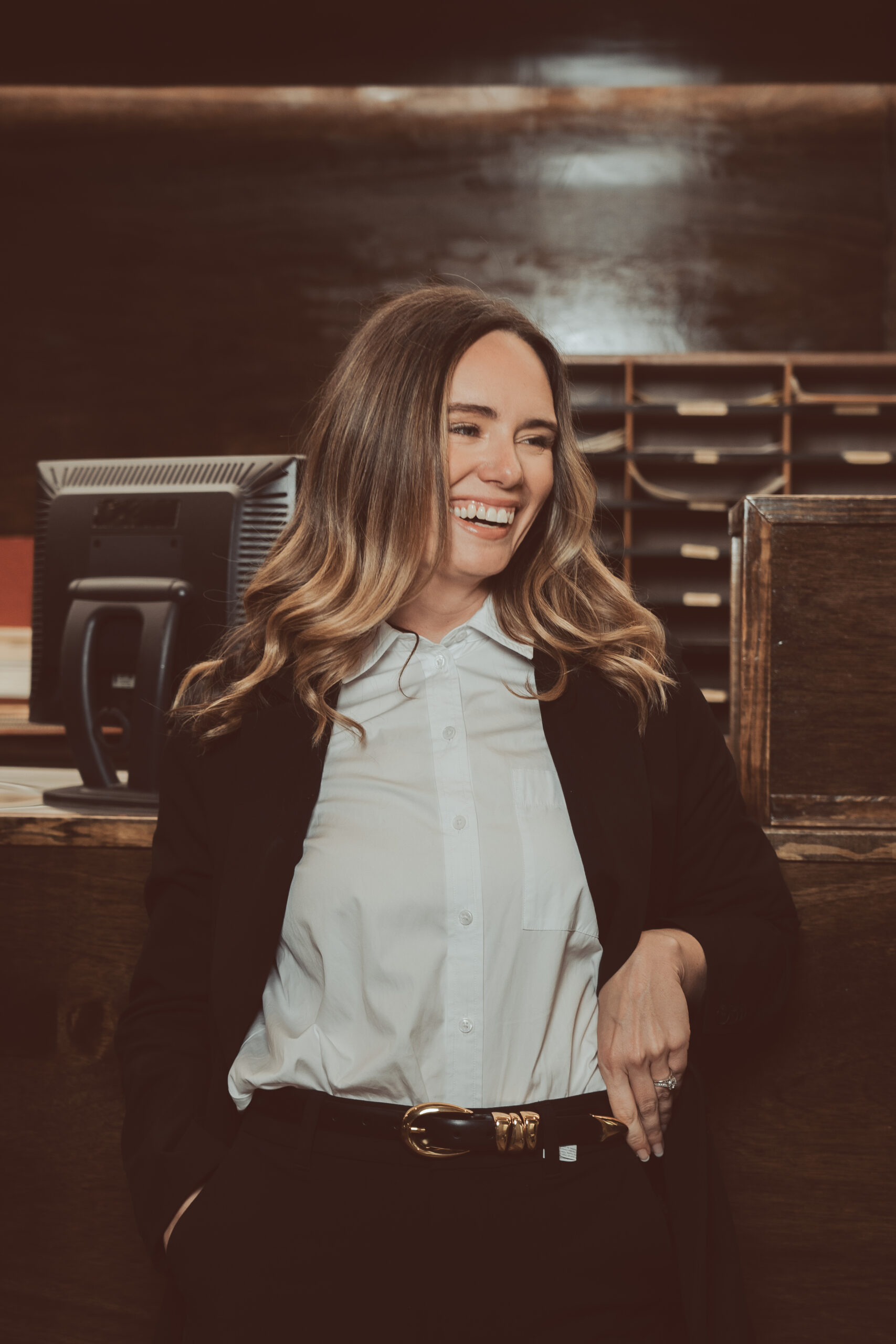
Join me in conversation with Steph Crowder to break down her first rebrand after over ten years in business! We’re digging into “scrappy sales,” big identity shifts, and the role that her disruptive beliefs played in the process.
Steph Crowder is a business coach that believes in a modern approach to selling that doesn’t have to feel sleazy. Tired of bro marketing? This episode is for you.
A Creative's Guide
A blog written by creative director Jasmine Haitalani where she shares how she approaches each part of brand building in her business and for industry leading clients. Indulge in each post and get inspired to take action that allow you to set the standard, improve your brand and make revenue.
TRENDING TRENDING TRENDING
featured
Branding Disruptive Beliefs and the Modern Approach to Sales with Steph Crowder
July 25, 2024
Steph Crowder’s brand recently went live! So today, we’re having a special conversation that will be shared on both of our podcast feeds to dive into the whole process. As usual, I’ll be asking her questions about how to process went for her. But unlike our usual routine, Steph will actually shoot questions back at me!
So buckle up and get ready to take some notes because we’re not shying away from any topic in branding, selling, and evolving in the online industry.
We Need Your Online Presence To Match Your Reputation in the Industry
Steph has been in the online space since 2014 and she’s never been through a rebrand process before this. She’s a business coach, and the self appointed queen of “scrappy selling” AKA: making sales now and worrying about everything else later. Her background is in sales and sales training and The Courage and Clarity Podcast was born in 2017.
Now, ten years into business, her reputation has grown so much and now it’s time for her online presence and brand to really grow with her reputation. I asked her:
Jasmine: “What made you decide that now is the time to go through the rebrand process?”
Steph: About 18 months ago, I came back from taking a little side detour job as a marketing director with another online company. So in making this decision, it was a financial decision that I knew my business needed.
You and I are actually in a mastermind together. And something I have realized lately is that I noticed this gap in my own self concept as a business coach. My scrappy online presence, with the Squarespace website I built herself years ago, was something to be proud of. But the presence wasn’t growing at the same speed as the business itself. The website itself was from a totally different era in my life. Now, I’ve got two kids and my daughter just turned eight. I simply outgrew the old website!
One thing you said that stuck with me was, “we need your online presence to match your reputation in the industry.” I have helped thousands of people but I was holding herself back from being discovered. Now, I’m ready to expand into more cold, new markets to welcome people and give them that great first impression.
How Rebranding Gives You Permission to Show Up Differently
Jasmine: “What do you think has been the difference between Courage and Clarity then versus Courage and Clarity now as a brand, as a movement?”
Steph: I have people who’ve been listening since day one to January 2017. And I am certain that if you’ve been listening to my podcast that long, you have likely noticed an evolution. This is just such an interesting conversation for anyone in business. If you stay with it long enough, you are going to evolve.
I started this podcast in my twenties and I’m getting up there in my thirties now. I’m two kids in, I’ve changed, I’ve grown. And of course my experience as a coach has grown as well. And there are many things that I believed about business and what I teach in my philosophies back then that I still to this day are like my ride or die philosophies I don’t think will ever change their time. They’re timeless.
But there are also things that I’ve updated and changed and grown up. And so we sat down and had this amazing conversation where we were talking about what courage and clarity really mean. I’ve been talking to many people who I think are feeling a little bit like they’re outgrowing parts of themselves in their business. And they’re not sure what to do with that.
In 2017, I was a co host on a podcast with three dudes and me. I was the token lady. And there were not a lot of female entrepreneurship podcasts. It was very bro-dominated. Great guys, no shade to them at all. But I was a new mom and there was not a lot of content about the uniquely feminine juggle of being a business owner, having children, mothering and everything in between.
And so I strongly hoped to really shine a light on stories of women who were making it all work. They had the sort of courage to go for it and the clarity to know how. And in those days, my role in my listeners’ lives, I think, was a bit more cheerleader vibes.
The courage part was like, “you can do it, you can go for it!” And that was super appropriate back then, because like I said, I think it was a bit of an emerging market for female entrepreneurship. Here we are fast forward to 2024 and the word courage has really transformed. I’ve put my pom-poms down a little bit. Now, courage is more about boldness. It’s more about grit. It’s more about being terrified and doing it anyway. And I think as a coach, now I’m more willing to serve up the tough love. The people pleasing tendencies of the past have really faded away.
Being Courageous Enough to Promise Client Results
Jasmine: “When I was going through like your copy and we were building your site, I noticed you saying things like same day sales and promising a sold out group programs. Those are very courageous promises. So how did you even get to a position where you felt comfortable you could deliver that?”
I think does come down to the courage to get better at helping our clients. Universally, I think a lot of us struggle with promising client results. People say “I don’t know if I can promise that, or I don’t know if I should put my stake in the ground and say, you’re going to get X, Y, and Z.”
And my response to that is always, “what can we do to help you get better at serving your clients?” If that’s the case, we can increase your confidence. What are you confident that you can do for your clients? Because that’s a huge shift when you realize people are hiring us as coaches, not just for the cheerleading.
I have really loved leaning into promises that scare me, results that scare me because it makes me say, okay, game on. These people are hiring me to help them figure out how to make a sale in a day or how to sell out their group program. It’s called sold out group programs. It’s pretty clear what you want. And I’m clear on what my role is to help coach you until you get there. And so I think it is exhilarating. Have the courage to put it so plainly and so boldly.
I think it also creates this clarity in the client relationship. A lot of us who have tenure in the industry know the feeling of being on different pages with a client. They hired you and they had something in their head and you never really were clear on what your results are. So then, the client’s actually unhappy and you don’t even know why. And paradoxically, being clear on these are the results that you’re driving towards when you come into my program.
Sales Don’t Have to be Sleazy
Jasmine: “How do you think if we’re talking about sales in 2024, someone could easily look at that and think like, isn’t that sleazy? Are you cold dm’ing people? How do you respond to thoughts like that?”
Something that you pulled out of me right away that I locked in on in our first conversation was this idea of sales for the modern woman. This idea gave me so much permission to update parts of the process that felt very masculine and toxic. Sales have been a male-dominated field for so long. And frankly, that’s how I came up through sales as the token woman.
To be fair, it works in terms of results on paper. But what I believe I’m here to do as a sales coach is figure out, how can I connect super smart experts with the people who genuinely need them? To me, that’s all sales really is. One thing I love most about my business is the variety of types of people I work with. And my folks – they’re very confident in their expertise.
They are professors; they are directors; they are top of their fields, years and years of experience. They’re not lacking confidence in how they help clients. Where they’re lacking confidence is exactly what you’re saying is like, how do I find people without being pushy, without being annoying, without being gross? There’s so much resistance to even engaging in sales. But to me, if people, if those super talented people don’t learn how to make compelling invitations to the right people, that’s a problem.
What gets me out of bed in the morning is there are so many folks in the world who don’t get to benefit from my clients’ talents, from their experience. And so I see sales as connecting.
One of Steph’s Reputation Themes: Real Life Business
Jasmine: “I also think about the power of same day sales and how you broke it down a necessary skill. Because if there is a situation where you’re like, I need to create this income, you can. There are six, seven, eight figure earners that are still needing to use the skill.
I know one of the reputation based themes that we came up with was “real life business.” And I think there’s this picture perfect expectation that you reach a point where you’ve got it all down and don’t have to work on sales anymore.”
This is one of my favorite things to talk about because I have been on the back end of multiple businesses that do multi, multiple millions a year. The big fish that everybody looks up to are active in their sales process. They might be backdoor selling a 50k done for you offer and they’re not necessarily telling you about that because tt’s not a sexy marketing message.
It doesn’t sell as well. It sells really well to be like “you’re gonna learn how to have passive income and then you’re gonna sit on the beach in Aruba.” It’s not as sexy to be like, “yes, you’re going to do passive income, but also there’s going to be times when you need to close a 50 ticket K contract. Cause you’ve got a bad tax bill.”
I had a client say to me, “if I were any good at this, I would be just booked out. I would just be instantly booked out.” and she’s very talented at her craft. To watch her doubt her expertise because she has this belief is so upsetting. And I think that is a thought that’s perpetuated by the industry.
But you can learn this. You’re not good at sales because you haven’t worked on this as a skill. And so you can be the best therapist. You can be the best coach. You can be the best at anything and still have a sales problem. And so people really need to work on those problems separately.
The Personal Brand Pyramid
Jasmine: “This topic of scrappy selling came about through the personal brand pyramid process. You can think about marketing your brand, your personal brand through three key areas. So you have the beginning reputation area where you come up with three themes that you can talk about consistently that tie back to your
So for Steph, real business, scrappy business, was a key theme. Like Steph mentioned, she made all of this happen without necessarily having the best presence the fanciest website, the greatest, photoshoot through that process. And then we also talked about confidence and courage, which obviously, we talked about earlier on this [00:24:00] episode and I remember the third theme being around being sold out, whether it’s like same day sales or like selling out group programs. One of the hot takes that feeds into the next part of the pyramid is Steph’s belief that group programs are better than one on one. Tell us more about that?”
steph: Yes. Working with Jasmine, I really wondered – what are my disruptive beliefs? In 2020, you could really get away with trying to do what everybody else is doing. That was the game for a while. For example, if everybody’s doing flat lays on Instagram, just do that. Or if everybody’s making a course, just go ahead and get your course made.
I think in 2024, it’s really about as this industry matures and every industry goes through the cycle of maturation, where we are in the industry? If Everybody’s heard the basics or the commonly held beliefs, none of itsits novel anymore. I believe all of us have disruptive beliefs within our businesses.
What are the things that I take for granted as part of the Steph Crowder philosophy that might actually be amazing to people? What stands out is having a contrarian opinion. So for me, my belief and my experience is that group coaching can really be better than one on one. I believe a group coaching container is 10x the coaching because you’re getting coached every time another member is getting coached.
You get to listen to 10 other people get coached. And my clients are always telling me, “I didn’t even realize I had that question, but I totally did.” I still get nervous every time I get coached, and it’s a different energy to listen to other people get coached.
How the Personal Brand Pyramid Can Be Applied On Instagram
Steph: “Jasmine, can you share how people can take that personal brand pyramid and think about something like social media, in particular Instagram?”
Jasmine: Yeah. This is actually what helped me remove the mind drama from trying to be on top of every single trend. And I need to post a reel this many times to get the reach to expand my audience. So, starting off, figure out your pyramid. What are those themes? And then, instead of thinking about replicating other people’s strategy, you can ask yourself, “how do I want to deliver this specific style content or this specific topic?”
For me, I’ve been all about quality over quantity. And I’m one of the few creative agencies out there that leads with thought leadership on carousels. Over time, I’ve found where I like things placed. For example, my soap box moments are on stories. My client results are usually best worked as a carousel. But this will be different for each person based on their personal brand pyramid.
I think we’ve taken a step too far with content repurposing. We’ve taken ourselves out of the creative element. And I cannot tell you how many people I’ve had a conversation with when they were like, “I don’t remember the last time I sat down to really create a quality intentional post just because something was on my mind that day.” Because we’re so busy in the day to day.
I’ve been challenging myself, even if I don’t show up every day, to think “how can I challenge myself to sit and think of what are the conversations I’ve been having with my clients?” or “What is the thought that I’m having about what’s going on in the industry?”
Don’t Wait to Share Client Results Until the End of Your Container
Steph: “Absolutely. I think you’re a really great example of someone who seems to be doing a lot with referral and network. Can you guys speak to how you’ve created that?”
Jasmine: Yeah. I think people underestimate the value of their own expertise and creating sales for there. So for example, the quality of our delivery is a number one focus for us. When people have gone through the rebrand process, they’re sharing that positive experience with others.
Sometimes, it takes months, depending on the timeline of each client. And so we don’t want to wait until they’re done working with us for us to tap into the ability for them to say good things about us. So our client’s processes are being shared throughout the experience. They’ll tag us. They’ll be like, “we’re so excited about what’s to come.”
I also never underestimate the value of sharing their results, their testimonials, what clients are saying about us. I think sometimes people don’t want to share a lot of their results because they want to stay small and they’re worried about bragging.
Sometimes, people feel like they need to get this crazy result to share anything, but it should really be sharing every small win along the way.
Steph: Absolutely. You told such a compelling story to me just by showing what is possible. By displaying what other people had done with their branding. And what’s really cool about that is, this is actually super instructive for anybody out there who worries about “promising results.” I always tell people results will vary.
But we can still show the results that happened for individual clients because what it creates in your new client’s brain is, Oh, that’s really cool for them. I wonder what my mine would be. So if I look at other work that you’ve done, Jasmine and other people’s brand, it’s nothing like what I want for my brand.
And I’m like, [00:40:00] Oh, that could never be like, that’s not me, but I can still be so inspired by it. And it still tells such a story. So it’s not about me copying the results or me wanting the exact results that you got for this person or that person. But it creates this question in my head of Oh, I wonder what she would.
do for me. And I think we forget that in our sales process.
When is the Right Time to Rebrand?
Steph: When in someone’s business journey, should they think about doing a rebrand?
Jasmine: Good question. I personally think anyone that has made over six figures is ready for an actual rebrand. It could help them set themselves up in a direction where they can continue growing their brand and scaling it a lot quicker than they would without one.
For those of you that are starting out, I also like to treat branding as a journey. It’s never too early to start working on your brand. You can always piece together an aesthetic, colors, messaging, reputation, and more and then evolve as time goes on.
Steph: Yeah, I think that’s great. And one piece of advice that has been surprising for me is just start paying attention to brands and websites that are compelling to you. There are elements of my rebrand that were inspired by brands totally outside of my industry and it’s fun to see that come together.
Jasmine: Yeah, I love taking inspiration from outside industries. Whether it’s a completely different niche, celebrities, pop culture, and doing it in a way where it doesn’t still look very trendy but still makes sense. And it can look personalized for the client. And honestly, that’s the work we do in brand revenue lab. I think investing in a custom rebrand when you’ve made zero money in your business, isn’t always the best move.
But the brand work still matters. Brand Revenue Lab is a lot where we can do some of that foundational work and coach you through that process and figure out, how do you want to almost have a DIY brand, but guided with experts too.
Connect With Steph Crowder And Check Out Her Rebrand
Steph’s Rebrand:
https://highflierpowerhouse.com/steph-crowder
Steph’s Website:
https://stephcrowder.com/
Steph’s Podcast:
https://stephcrowder.com/podcast/
Steph’s Instagram
https://www.instagram.com/heystephcrowder
THE LATEST
THE
MARKETING EDIT
Get edits you can make to your brand marketing to increase your revenue delivered straight to your inbox.
JOIN OUR EMAIL SERIES
Learn how to create an extra $100k with your Rebrand by becoming the only option, just like our clients.
Get access to our free training where you'll learn how to make an extra $100,000 in revenue after you rebrand your business as a coach or service provider.
GET THE TRAINING
COPYRIGHT HIGHFLIER POWERHOUSE 2026 | TERMS AND CONDITIONS | PRIVACY POLICY
COPYRIGHT HIGHFLIER POWERHOUSE 2024 TERMS AND CONDITIONS | PRIVACY POLICY
Navigation
Learn
Connect
Highflier Powerhouse is an immigrant-founded agency based in the United States that offers marketing and creative services to service-based entrepreneurs across the globe.
a creative's guide
BRAND YOUR WAY TO A MILLION
THE SALES STUDIO
THE INDUSTRY'S CHOICE
THE MARKETING EDIT
[THE PODCAST]
[THE blog]
[THE email list]
[DFY RETAINER]
[DFY PROJECT]
HOME
CLIENT CATALOG
ABOUT US
BROWSE //
WORK WITH US //
AND MORE //
HOME
CLIENT CATALOG
ABOUT US
BROWSE //
WORK WITH US //
AND MORE //
RESOURCES
OUR OFFERS
BECOME THE CELEBRITY OF YOUR NICHE
[PRIVATE PODCAST]
a creative's guide
BRAND YOUR WAY TO A MILLION
THE MARKETING EDIT
[THE PODCAST]
[THE blog]
[THE email list]
GO BACK
BECOME THE #1 BRAND IN YOUR NICHE
[the PRIVATE PODCAST]
Paragraph
Paragraph


